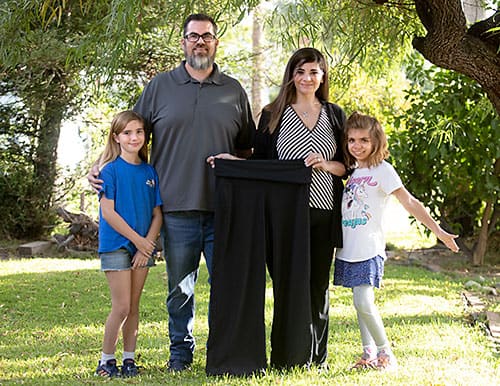Couple makes family, and good health, a top priority

The turning point came, as they often do—at an inconvenient moment. On a cool early evening last February, La Verne’s Amy and Matt Burchell and their two daughters, then eight and seven, were at Knott’s Berry Farm for some family fun.
The sun was setting, their kids were happy, and all was well. Finally reaching the front of the line for the Sierra Sidewinder rollercoaster, they started to board the ride. Soon though, Ms. Burchell realized she was too physically large to buckle the seat belt.
“My daughter had to go by herself,” Ms. Burchell said. “I was like, ‘Oh, no way, this is not happening.’ It was so humiliating.”
Over nearly eight years of marriage, the Burchells—like a lot of couples—had gained some weight. Both 41 at the time, Ms. Burchell was up to 274 pounds, and her husband was pushing 400.
Three weeks after the incident at Knott’s, Ms. Burchell was sitting in a doctor’s office in Rancho Cucamonga. She was there to look into gastric bypass surgery, a procedure in which a patient’s stomach is reduced in size and the small intestine is re-routed, resulting in fewer calorie
“We were done,” Mr. Burchell said, his voice betraying the emotional heft of how his life had changed since he and his wife both underwent the surgery in August, 2018. “I was done being the way I was, eating fast food and constantly … I was just over it.”
Spoiler alert: today Mr. Burchell, who began at 377 pounds and a 44-inch waist, is down to 255 and a 36. His wife is down from 274 and a size 22, to 170 and a size 10.
She was born and raised in La Verne and has been a program specialist for the city of Claremont’s nutrition program for three years. Mr. Burchell grew up in Tustin and works as a customer service rep for Newport Beach-based William Lyon Homes.
The extra weight accumulated slowly for both of them.
“I’ve been overweight most of my adult life, especially after I had my kids,” Ms. Burchell said. “It was really starting to become a struggle, especially with my work, which is fast paced.”
Mr. Burchell said he was always a little bit “chubbier” as a kid. “I was always embarrassed to take my shirt off to go swimming or go the beach,” he said. “All through my childhood—elementary, middle school, even up to high school—I was made fun of a lot.”
The parents both mentioned how they didn’t want their girls to be ashamed to be seen with them. It was a heartbreaking, if telling, bit of raw honesty.
“I wanted to walk them down the aisle one day,” Mr. Burchell said. “I was pretty heavy, and I didn’t want them to feel embarrassed of me. I wanted to play with them more. My excuse was I was always tired or I didn’t want to do it. It was because of them that I had to change. I wanted to be around.”
Ms. Burchell recalled a pivotal discussion with her eight-year-old daughter.
“I just told her, ‘You don’t want to be embarrassed of your mom, do you? All the other moms are fit, and they all go to school in yoga pants and look great.’ Well, I didn’t look like that. So I told the girls, ‘Mom’s going to be a lot healthier and we’ll be able to go places.’
“It was just a no-brainer at that point. Everything had to change, just everything.”
By taking the unusual route of both having the surgery on the same day, the Burchells formed an additional partnership on top of their marriage. It was a commitment to an entirely new lifestyle.
“I’m so glad that we did it together,” Mr. Burchell said. “It was really good because it made us accountable. I didn’t want to disappoint Amy.”
Now their meals are simple—and cheap. At his peak, Mr. Burchell estimated he was eating more than 4,000 calories a day. The Burchells now eat a protein heavy diet of between 1,000 and 1,200 calories per day.
“We eat so little,” Mr. Burchell said. “We’re always saying, ‘I guess this is what skinny people must eat’ because it’s just so much less food.”
The first gastric bypass surgery was performed in 1966. Techniques evolved, but the surgery remained relatively uncommon until 1994, when the first laparoscopic bypass was performed. In 2017, some 228,000 Americans opted for the procedure, according to statistics from the American Society for Metabolic and Bariatric Surgery.
Gastric bypass comes with a host of nasty possible side effects. It’s certainly not for everyone, and determining if the Burchells were psychologically prepared for whatever may come was a major component of the lengthy pre-surgery screening process.
“I was so ready for it mentally; I was more than ready,” Ms. Burchell said. “I don’t feel like I’ve had any sort of mental side effects, even though I lost my best friend comfort-wise, which was food. But my readiness and willingness to do it completely overpowered that.”
Now more than a year post-op, theirs is a success story. They both have no regrets—and no major side effects—and are living decidedly better lives.
“I just had a company function today and a lot of people didn’t even recognize me, and the people who did were just astonished by my weight loss,” Mr. Burchell said. “It was good.”
This year the Burchells treated themselves to season passes to Disneyland. Family trips to theme parks are now absent the dread and pathos of years past. They are as they should be for any family with young children: joyous.
“I’m telling you, we ride every roller coaster,” Mr. Burchell said. “We ride on every ride.”
—Mick Rhodes
mickrhodes@claremont-courier.com










0 Comments